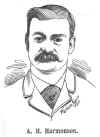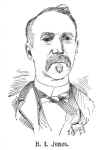now stands. In the spring of '81 he moved to Almena and opened a stock of general merchandise and has continued in that business at Almena ever since.
He has always taken an active part in politics as a republican. He was a candidate for county treasurer in 1889 but failed to got the nomination.
He has been a zealous member of the Christain [sic] church for thirty years.
He was a charter member of the Masonic lodge at Norton and its first treasurer.
He afterward took an active part in the organization of the Masonic lodge at Almena.
Of late years he has become an enthusiastic prohibitionist and votes with that party at this time.
 Alva Holland Harmonson was born March l 9, 1856, in Keokuk county, Iowa, attended common school and took a two years' course in the Oskaloosa college.
He came to Norton county, arriving June 29, 1877. He was for a time deputy sheriff under C. W. Posson.
He took a homestead three miles northwest of Norton; was nominated county clerk on the low salary ticket in 1881 and elected defeating W. T. Shoemaker the regular republican nominee.
He was nominated and elected again as a republican in 1883. In 1885 he was a candidate for register of deeds; but A. K Mills secured the nomination.
Alva Holland Harmonson was born March l 9, 1856, in Keokuk county, Iowa, attended common school and took a two years' course in the Oskaloosa college.
He came to Norton county, arriving June 29, 1877. He was for a time deputy sheriff under C. W. Posson.
He took a homestead three miles northwest of Norton; was nominated county clerk on the low salary ticket in 1881 and elected defeating W. T. Shoemaker the regular republican nominee.
He was nominated and elected again as a republican in 1883. In 1885 he was a candidate for register of deeds; but A. K Mills secured the nomination.
He was married to Emma F. Hatcher December 24, 1878. They have had eight children, six of whom are still living.
He engaged in the implement business in 1886; but finding that business unprofitable he abandoned it in 1890.
He is in broken health and is not engaged in any business at this time.
 Edward I. Jones was born on a farm in Greenfield in Luzern [sic] county. Pennsylvania, April 27, 1837.
After attending the public schools for a number of years and the Dunduff academy for a time his educational advantages terminated in a course of private instructions in Latin, music, book-keeping and natural philosophy.
Edward I. Jones was born on a farm in Greenfield in Luzern [sic] county. Pennsylvania, April 27, 1837.
After attending the public schools for a number of years and the Dunduff academy for a time his educational advantages terminated in a course of private instructions in Latin, music, book-keeping and natural philosophy.
In 1855 he returned to Baltimore to learn the arts and mysteries of laying brick; but finding that business uncongenial returned home and served a three years' apprenticeship as tin and sheet-iron worker.
In 1859 he returned to Baltimore and entered the dry goods trade, where he remained until 1868 when he went to Philadelphia as dry goods salesman.
His first vote was cast in 1860, for Bell and Everett, presidential candidates of the now defunct American party.
He has ever since voted the republican ticket when it was possible to do so.
He was among the first in Baltimore to join the union league, and carried the musket on many occasions in defense of that city; but was never mustered into the service.
In the fall of 1878 he left Philadelphia and for a short time engaged in general merchandise at Belpre, Washington
|